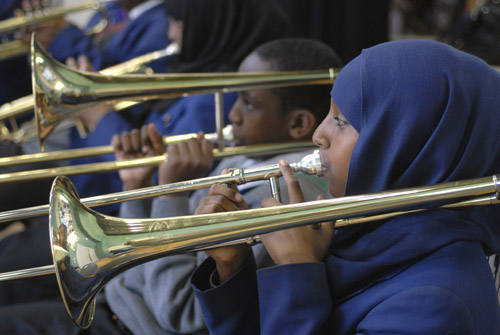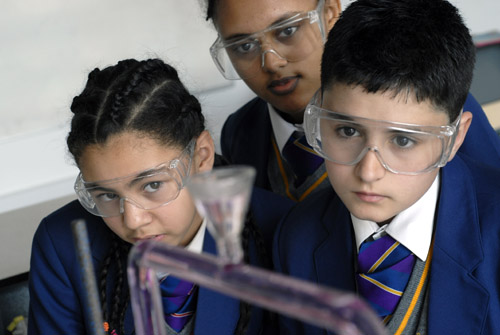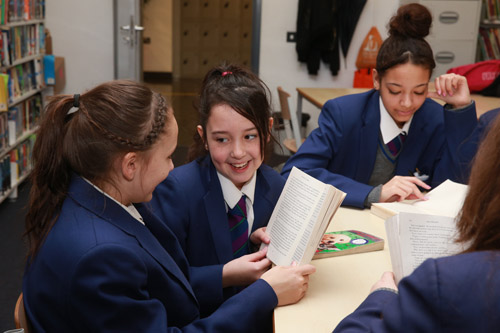We have high expectations for all our pupils and ensure that every learner is challenged and supported to reach their full potential.
Physical Education (PE) Curriculum
Purpose
The Physical Education curriculum aims to inspire all pupils to succeed and excel in competitive sport and other physically-demanding activities. It provides opportunities for pupils to become physically confident in a way which supports their health and fitness. Opportunities to compete in sport and other activities, to build character and help to embed values such as fairness and respect.
The aims of Physical Education are:
- Develop competence to excel in a broad range of physical activities.
- Physically active for sustained periods of time.
- Engage in competitive sports and activities.
- Lead healthy, active lives.
- Developing techniques to improve performance.
- Analyse performance and demonstrate improvement to achieve personal best.
- Overcoming opponents in direct competition as part of a team.
Key Stage 3 PE
The KS3 curriculum is in line with the national curriculum. Broad topics include:
- Baseline fitness testing
- Invasion games, basic skills, rules and techniques (netball, basketball or football)
- Gymnastics (rolls, balances and partner work)
- Athletics (running, jumping and throwing)
- Striking and fielding games (cricket or rounders)
- Dance (appreciation of different dance cultures and contemporary dance styles)
- Health-related fitness (Principles of Training)
- Invasion games, strategy, tactics and competitions (netball, basketball, handball)
- Gymnastics, rolls, balances and partner work and group work
- Athletics (focus on challenge and rules)
- Striking and fielding games, tactics and strategies
- Dance (appreciation of different dance cultures and contemporary dance styles)
- Invasion games
- Sports education
- Coaching and officiating
- Gymnastics – vaulting and sports acro
- Trampolining
- Health-related fitness – methods of training
- Leading a healthy and active lifestyle
- Athletics (training for specific events)
- Planning and leading sports sessions
- Striking and fielding games
Key Stage 4 PE
Purpose
Our focus in Key Stage 4 PE is to provide our pupils with an array of sporting, exercise and physical activity experiences, regardless of their expressed preferences. We do however make a concerted effort to take our pupils’ suggestions into account and incorporate these into our Programme of Study.
We feel by doing so we are able to ‘get the best out of our pupils’ which is indicative in their attitude and approach to the subject. This is evident in pupils’ efforts regarding level of participation and their appreciation of sport and physical activity in general.
Aim
Our aim is to make sport and exercise part of our pupils’ habit and routine. As well as making them cognisant of a healthy lifestyle being quintessential for quality of life and longevity.
A fundamental aspect of our curriculum is that of participation, competition and sportsmanship.
Firstly: Participation – every pupil has this mantra engrained from key stage 3 all the way through to key stage 4. It is the expectation that each student gives his or her best at all times so as to develop, fulfil and realise their full potential; as well as to be fair to their team mates and opponents.
Secondly: Competition – this is a vital element which mirrors that of the working world and societal job market. Through the encouragement of competition our students are provided with numerous opportunities to perform their skills, implement strategy and tactics under pressure situations.
Thirdly: Sportsmanship – we feel that this is imperative to foster and inculcate healthy camaraderie between peers. The payback for our students’ in-turn is the development of accountability and resilience when dealing with various challenges.
Our pupils adopt various roles to understand all perspectives and viewpoints for a particular sport. These are in the form of the referee, umpire, coach and analyst; greater insight is obtained into the running of particular games. It is our plight for our students to respect sport and games at all times.
Opportunities in the curriculum
Activities within the curriculum to use and develop a variety of tactics and strategies to overcome opponents in team and individual games:
- Badminton, Basketball, Football, Netball, Rounders and Table Tennis.
Activities to develop their technique and improve their performance in other competitive sports:
- Athletics and trampolining
Pupils take part in team-building, problem solving and strategic games and challenges. The purpose is to encourage our students to learn to trust their peers and overcome obstacles – individually or as a group.
Sports Leaders Level is a nationally recognised qualification that enables successful learners to assist in leading purposeful and enjoyable sport/physical activity, under direct supervision. The qualifications are designed to use sport and physical activity to help young people develop and hone their leadership skills whilst helping them and others stay physically active.
Young people undertaking a qualification in Sports Leadership will learn and demonstrate important life skills such as effective communication and organisation whilst learning to lead basic physical activities to younger people, their peers, older generations and within the community.
The course involves both guided and peer-to-peer learning, and supervised leadership to ensure that learners have all the skills they need to lead basic physical activities to other people. By offering the Sports Leadership at Level 1, it will ensure that pupils will have a structured leadership pathway to higher levels. When pupils have completed this course they will be able to progress onto the Sports Leadership Level 2 – which is widely recognised – and the Level 3 Qualification in Sports Leadership (HSL3), which carries UCAS points.
Pupils will need to achieve the following:
- Complete a number of worksheets based on leadership skills and behaviours.
- Leadership skills and behaviors as part of a group.
- Audit of leadership skills.
- Assist in leading at least 1 x 15 minutes sport/physical activity session.
- Plan, assist in leading, and review a sport/physical activity session.
- Complete an additional 1 hour demonstration of leadership.
- Act as an official in 1 x15 minutes sport/physical activity session.
Course requirements
Pupils on this course will require the leadership skills including: organisation, planning, communication and teamwork through the method of sport. Pupils also need to be confident at working in front of other students and leading short sessions by themselves, as pupils involved in the sport leadership programme are expected to assist and lead in a number Key Stage 3 lessons. This will help the learner to develop the craft of delivering practical activities and also umpire/referee games/physical activities successfully and confidently.
There is also the opportunities to go to primary schools and deliver a range of physical activities and sporting events. Pupils are required to have a good knowledge about a number of sporting codes and different physical activities in order to lead a session. Pupils must be willing to be flexible and patient. As a Sports Leader they are required to be professional at all times and must be dressed appropriately for every single session (navy-blue school t-shirt and navy-blue bottoms).
Why study AQA GCSE PE?
The AQA GCSE PE course studied by pupils from Years 9 to 11 is a very popular option choice nationally. It is an excellent course, providing the foundation for post-16 study of A-level PE and forms the basis for the study of BSc (Hons) Sports Science at university. Furthermore, the key modules within the course that are studied such as Sports Psychology, Physiology and Biomechanics also provide a useful insight into additional post-16 A-level subjects such as Psychology, Human Biology and Physics.
Why study PE at Platanos College?
Physical Education at Platanos College will enable your child to learn both the practical and theoretical skills required to take part in lifelong sport and training. Your child will be encouraged to develop a symbiotic relationship between the theoretical and practical elements of sport and will explore this through a mixture of classroom, practical and lab/gym-based lessons. Throughout the course pupils will be given the opportunity to take part in a wide range of sporting activities and have access to extra-curricular clubs run both at the school and within the local community. Pupils will be expected to stay fit and healthy and be a regular and committed member of at least two different sports clubs.
Teaching and Learning
PE lessons at Platanos College are delivered by a broadly skilled and dedicated team of professionals who share an unshakeable passion for the teaching and learning of Physical Education. The department has always believed in the ‘sport for all’ outlook with bespoke lessons delivered to pupils depending on their sporting ability and confidence. In addition to traditional school sporting provision of team games such as football and netball, our curriculum also provides broader opportunities to participate in handball, trampoline, badminton, dance, gymnastics, table tennis, athletics and basketball. In addition to generic theory lessons pupils are challenged with theory-based practical lessons as this caters for different learning styles and provides a sense of application to pupils’ learning. In addition to this pupils are supplemented with rigorous homework, podcasts, and differentiated resources to support their learning. We are firmly of the belief that this provides a curriculum where pupils have a deeper embedded knowledge of the subject.
What can you do in the future with Physical Education?
GCSE PE provides a solid foundation for further studies whether this is A-level PE, BTEC or other recognised sporting qualifications. It provides a pathway into the many careers such as: the leisure industry, fitness industry, nutritionist, coaching, PE teacher, sports injury management, sports psychology, sports science, sports development, sports journalism and media.
Educational visits
There will be a range of opportunities including visits to:
- Elite sporting universities
- Premier League stadiums
The course covers the following units:
Paper 2: (Year 10) Socio-Cultural Influences and Well-being in Physical Activity and Sport
- Sports psychology
- Socio-cultural influences
- Health, fitness and well-being
- Use of data
How it is assessed:
- Written exam: 1 hour 15 minutes; 78 marks (30% of GCSE)
Paper 1: (Year 11) The Human Body and Movement in Physical Activity and Sport
- Applied anatomy and physiology
- Movement analysis
- Physical training
- Use of data
How it is assessed:
- Written exam: 1 hour 15 minutes; 78 marks (30% of GCSE)
Non-Exam Assessment: Practical Performance in Physical Activity and Sport
- Practical performance in three different physical activities in the role of player/performer (one in a team activity, one in an individual activity and a third in either a team or an individual activity).
- Analysis and evaluation of performance to bring about improvement in one activity.
How it is assessed:
- Assessed by teachers – Moderated by AQA (100 marks; 40% of GCSE)
Team Activity List
| Association Football | Badminton | Basketball |
| Camogie | Cricket | Dance |
| Gaelic Football | Handball | Hockey |
| Hurling | Lacrosse | Netball |
| Rowing | Rugby League | Rugby Union |
| Squash | Table-Tennis | Tennis |
| Volleyball |
Individual Activity List
| Amateur Boxing | Athletics | Badminton |
| Canoeing/Kayaking | Cycling | Dance |
| Diving | Golf | Gymnastics |
| Equestrian | Rock Climbing | Sculling |
| Skiing | Snowboarding | Squash |
| Swimming | Table Tennis | Tennis |
| Trampolining |




